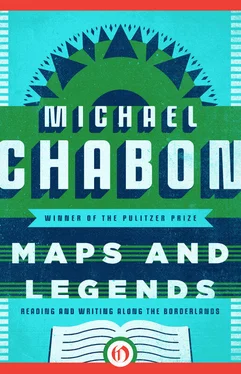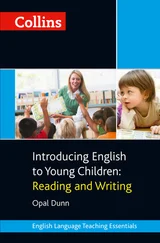Under her spell, and frightened by the implications of Dust’s evident attraction to experience in the Blakean sense, to Fallenness — believing that Dust may be the physical manifestation of Original Sin itself — the Church leadership has authorized Mrs. Coulter to lead a northern expedition of her own, one that will seek to determine whether Dust — Sin — can be forestalled, fended off, or eliminated entirely, by the intercision of a child before his or her daemon has “settled.” Naturally this course of research, carried out at a remote post in the Arctic, where Dust streams most plentifully, requires a steady supply of preadolescent subjects. Under Mrs. Coulter’s orders, teams of child-snatchers — known semimythically among the local children as “Gobblers”—fan out across England, baiting their traps with sweets and kindness. When her best friend at the College, a servant’s child named Roger, is stolen away by Mrs. Coulter’s General Oblation Board, Lyra determines to set off for the North and save him.
The first volume of the sequence, The Golden Compass, is taken up with the competing schemes of Lord Asriel and Mrs. Coulter to understand and if possible control Dust, and with Lyra’s quest to find Roger and at the same time to convey to Lord Asriel (funded again and back in the North) a marvelous contraption called an alethiometer. The alethiometer is Pullman’s third great invention, after daemons and Dust. A beautiful instrument of gold and crystal, engraved with an alphabet or tarot of conventional symbols and fitted with knurls and indicator needles, the alethiometer will answer any question put to it, though it will not predict the future. When it comes to reading the alethiometer, a skill that normally demands a lifetime of training and study, Lyra proves to be a natural.
Under the alethiometer’s tutelage, and with the help of a troop of stout Gyptians, Lyra makes her way north, learning, in the usual way of such journeys, even more about herself and her history than about the world she lives in, and discovering that there is a prophecy among the witches that she seems to be about to fulfill. Along the way she encounters an adventurer named Lee Scoresby, a Texan from New Denmark (her world’s U.S.), who comes equipped with a hot-air balloon and a greasepaint-Texan manner that will be familiar to readers of Buchan and Conan Doyle; and the appealing Iorek Byrnison, who in spite of his Nordic name is a polar bear, or a kind of polar bear, polar bears in Lyra’s world having evolved opposable thumbs (they are mighty smiths) and the power of speech. Interestingly it is Byrnison the bear and not Scoresby the Texan who plays the Lee Marvin role in this novel, rousing himself from an alcoholic miasma of failure — it all turns on a question of bear politics — through admiration of the gifted and fiery girl.
With the help of her companions, and following a number of hectic battles and one chilling scene of paternal anagnorisis (moment of recognition), Lyra fulfills her pledge to deliver the alethiometer to Lord Asriel and rescue Roger and the other stolen children — though with results that she finds, in the former instance, disappointing (Lord Asriel is stricken with a weird horror when he recognizes Lyra at the door of his polar fortress of solitude) and, in the latter, unexpectedly tragic, as poor Roger provides the means for Lord Asriel’s breaching of the border between worlds.
The second volume, The Subtle Knife, introduces a new character, one who will come to assume an equal stature in the series to Lyra’s. He is Will Parry, a boy of roughly Lyra’s age who lives in a drab suburb near Oxford — our Oxford, this time. When we meet him, Will is struggling to protect himself and his mother — his father, an explorer and former Royal Marine, disappeared years before — from some sinister men, vaguely governmental, who are after the letters that Mr. Parry sent back home from the Arctic just before his disappearance. It’s a struggle for Will because his mother is no help at all; she’s mad, affected by some kind of obsessive-compulsive disorder that leaves her barely functional as a human being, let alone as a mother. For years, young Will has been handling all the duties and chores that his mother can’t manage, and caring for her on her bad days, working very hard to maintain the illusion that all is well in the Parry house. He doesn’t want them to come and take his mother away from him.
When the government agents grow overbold and confront his mother directly, Will realizes that his life is about to change. There is a poignant scene in which, seeking out the only kind, trustworthy person he has ever known — he has no friends — he leaves his bewildered mother with a nearly equally bewildered older woman who was once, briefly, his piano teacher, Mrs. Cooper (the name alludes to Susan Cooper, author of the beloved The Dark Is Rising sequence of novels, whose central protagonist is a boy named Will). Then he finds and collects his father’s letters, accidentally killing one of the government men in the process, and flees.
He flees — though this is not, of course, his intention at first — into another world, to a place called Cittàgazze, the City of the Magpies. For it turns out that there are other ways to pass among the worlds than by Lord Asriel’s costly method of child-sacrifice and transdimensional demolition. One can, if properly equipped, simply cut a hole in the membrane that separates realities from each other. To do this one needs a knife — a very special kind of knife, naturally: a subtle knife. There is only one of these in all the worlds; it was forged, some three hundred years ago, by the savants of the Torre degli Angeli, a kind of scientific academy housed in a castellated tower’in Cittàgazze. They forged it; and then, unfortunately, they began to use it, cutting their way from world to world, leaving a trail of carelessly abandoned holes such as the one through which Will, fleeing the murder he has committed, tumbles.
In the desolate, De Chirico streets of Cittàgazze, Will Parry meets Lyra; she has come from her world through the breach Lord Asriel created, hoping to solve the riddle of Dust, intuiting that contrary to the teachings of the Church, it may in fact be a blessing and not a curse. Lyra is at first as startled to see a living, thriving boy with no daemon as Will is to watch her pet cat transform itself into a stoat. But the two children, alone in a world of wild menacing orphans (all the adults here having fled or been devoured), form a bond and make common cause: Will, following hints in John Parry’s letters, intends to track his father down. And Lyra, taking instruction from the alethiometer, determines to help him. In an exciting scene Will inherits the subtle knife, and away the two children go, in search of John Parry and the riddle of Dust.
They are far from alone in these pursuits; a host of adult characters — Lee Scoresby, Iorek Byrnison, Mrs. Coulter, Lord Asriel, the witch Serafina Pekkala, a nun turned theoretical physicist of our world named Mary Malone — follow courses that parallel, intersect, or shadow Will and Lyra’s. The Golden Compass is Lyra’s book, structured around her and presented almost wholly through her point of view, and as such it reads very much like a traditional quest story. The Subtle Knife, with its shifting points of view and its frequent presentation of adult perspectives on Lyra and Will, has much more the flavor of a thriller. It is unflaggingly inventive, chilling, and persuasive, has a number of gripping action sequences, and ends with a thrilling zeppelin battle in the Himalayas. But something — the pleasure inherent, perhaps, in the narrative unfolding of a single consciousness — is lost in the transition from first volume to second; and though Pullman’s storytelling gifts reach their peak in The Subtle Knife, the sequence itself never quite recovers from this loss.
Читать дальше
Конец ознакомительного отрывка
Купить книгу












